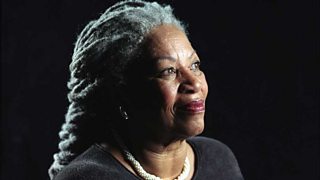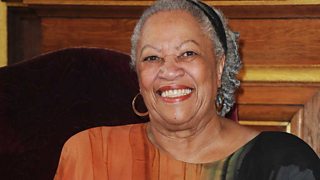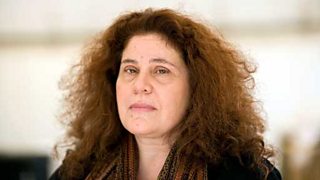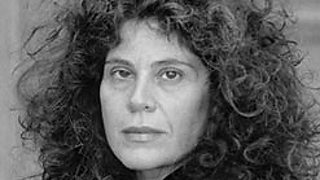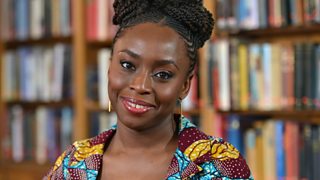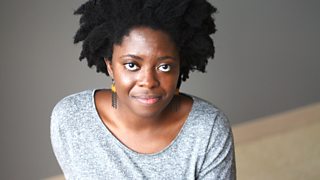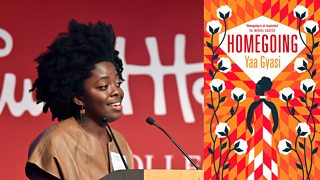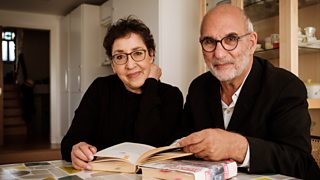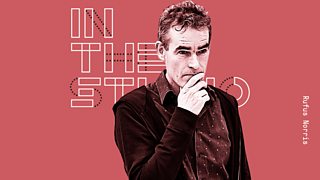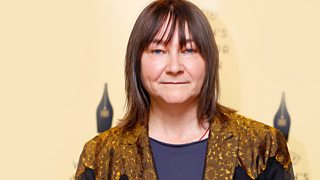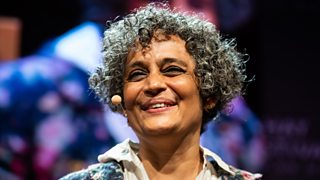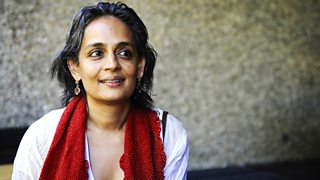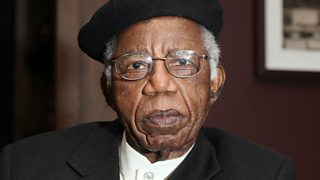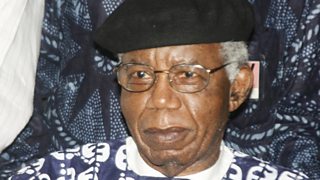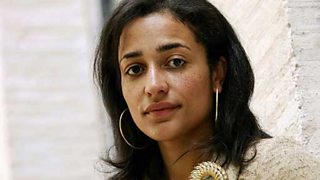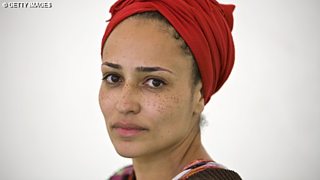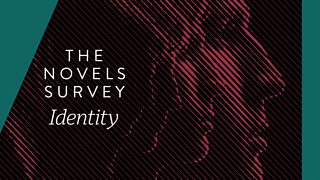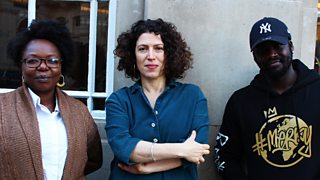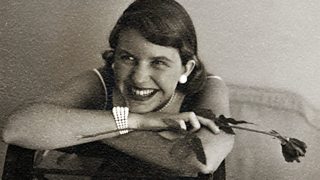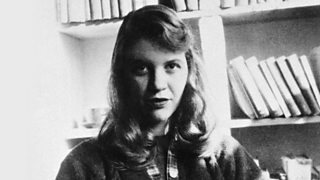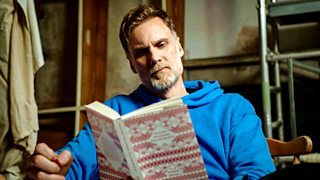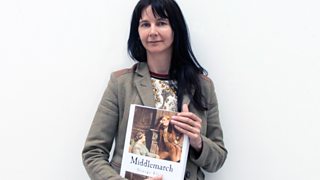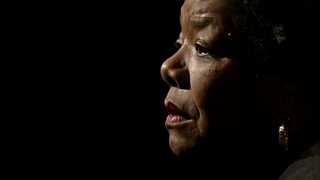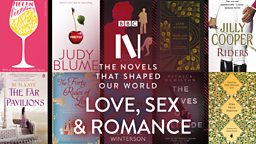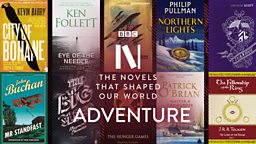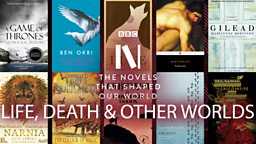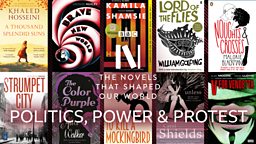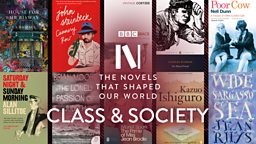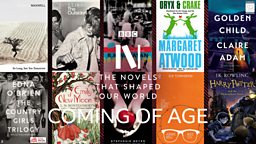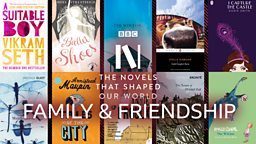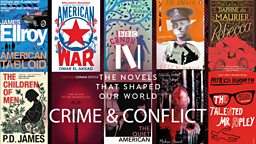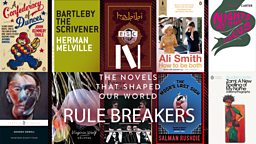Finding your story: Ten remarkable novels about identity
These ten remarkable novels about identity have been selected for the 100 Novels That Shaped Our World. They have already sparked about the qualities of books that help us to find ourselves. Explore the ten, then pick one up at a and join the conversation.
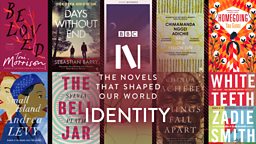
The panel have chosen these novels on the theme of Identity: Beloved by Toni Morrison; Days Without End by Sebastian Barry; Fugitive Pieces by Anne Michaels; Half of a Yellow Sun by Chimamanda Ngozi Adichie; ���˿���going by Yaa Gyasi; Small Island by Andrea Levy; The Bell Jar by Sylvia Plath; The God of Small Things by Arundhati Roy; Things Fall Apart by Chinua Achebe; White Teeth by Zadie Smith

Beloved by Toni Morrison, 1987
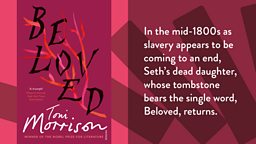
Beloved follows the story of Sethe as she tries to live as a free woman in Ohio, while battling with memories from years lived in slavery.
The novel brings the reader into Sethe’s life with her daughter and the ghosts of her past, and at the same time draws upon the wider destructive legacy of slavery and the multi-layered scars this has left in generations of black Americans.
Join the conversation - Book Club Questions
1. Why do you think the author uses flashbacks to tell the reader about Sethe’s experiences?
2. How does the novel convey the legacy and impact of slavery?
3. What role does the supernatural have in the story? How does the inclusion of ghosts and hauntings add to the atmosphere and plot?
Get Involved
-
![]()
DOWNLOAD: Toni Morrison on Beloved
James Naughtie's 1998 interview with Toni Morrison for Radio 4's Bookclub.
-
![]()
LISTEN: Morrison at Hay Festival 2014
"Our story, my story. That wasn't anywhere": author Toni Morrison on African American literature.
I never asked Tolstoy to write for me, a little colored girl in Lorain, Ohio. I never asked Joyce not to mention Catholicism or the world of Dublin. Never. And I don’t know why I should be asked to explain your life to you.Conversations with Toni Morrison, 1994

Days Without End by Sebastian Barry, 2016
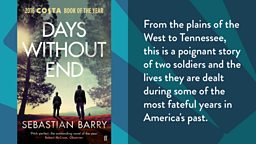
In the mid-1800s, as a young America pieces itself together and tears itself apart, Thomas McNulty, a seventeen-year-old Irish immigrant, joins the army with his companion John Cole.
Across the horrors of the Native American and Civil Wars, they explore the terrible hardships and the exquisite wonder of a country battling for its identity. Through it all, Thomas and John desperately forge their own shared path and place within a world, which can be bitter and brutal but also at times unspeakably beautiful.
Join the conversation - Book Club Questions
1. How does the exploration of personal identity relate to the wider events of the novel as a whole?
2. What effect does the style of language create? Why do you think it is written as a first-person narrative?
3. How do Thomas’s experiences compare to LGBT experiences in other novels, or other times and cultures?
Get Involved
-
![]()
The Irish writer talks to Rebecca Jones at the Hay Festival about the genesis of his novel, Days Without End.
-
![]()
LISTEN: Sebastian Barry on Days Without End
Sebastian Barry reads from and discusses Days Without End on Radio Ulster's The Arts Show.
A glorious and unusual story; seamlessly interwoven period research; and above all the unfaltering power and authenticity of the narrative voice, a voice no reader is likely to forget.Walter Scott Prize judges, 2017

Fugitive Pieces by Anne Michaels, 1996
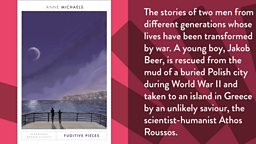
Jakob Beer is rescued from the ruins of Nazi-occupied Poland by a Greek geologist, Athos.
First living in hiding, then growing up in Greece, Beer becomes a poet and, shortly before he dies, begins to write his memoirs which form the novel; it is written in language that reflects the novelist’s occupation as poet.
Join the conversation - Book Club Questions
1. Why does the author make Athos’ occupation a geologist? What is the link between Athos’ obsession with the earth and what happened to Jakob?
2. Do you think it’s important that Jakob grows up to be a poet? How do you think this helps him to confront his past?
3. What do you think Jakob is attempting to achieve through this memoir? Is a faithful reconstruction of a personal history ever possible?
Get Involved
-
![]()
DOWNLOAD: Anne Michaels on Fugitive Pieces
James Naughtie and a group of readers talk to Canadian writer Anne Michaels about Fugitive Pieces, her prize-winning novel, on Radio 4's Bookclub.
-
![]()
LISTEN: Anne Michaels - Why I prefer not to talk about myself
Anne Michaels talks to Mark Lawson on Front Row about the 12-year gap between her two novels.
Fiction is expansive: it offers a way of layering things... It gives you the chance to bring the reader in slowly, via as many strands as you can.Anne Michaels, The Guardian, 2009

Half Of A Yellow Sun by Chimamanda Ngozi Adichie, 2006
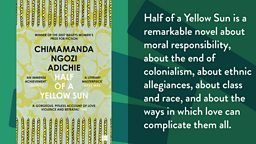
Twins Olanna and Kainene live a life of privilege in the early 1960s, with lovers, servants, and a wide social circle. When civil war breaks out, their world is shattered and they are forced to flee their homes.
Life becomes precarious, and problems like love and betrayal are sidelined as violence and famine dominate their lives. The novel raises important questions about moral responsibility, colonialism, class and ethnic divisions, and belonging.
Join the conversation - Book Club Questions
1. What effect does the violence of war have on the five primary characters?
2. Did this novel give you a new understanding of Nigerian and Biafran history? What did you learn about Britain’s involvement?
3. What parallels does this novel have with refugee stories today?
Get Involved
-
![]()
LISTEN: Chimamanda Ngozi Adichie on Half of a Yellow Sun
Nigerian author Chimamanda Ngozi Adichie discusses Half of a Yellow Sun on World Book Club.
-
![]()
LISTEN: Adichie discusses writing that difficult second novel
On Open Book in 2006, Chimamanda Ngozi Adichie talks to Marilla Frostrup about her then newly-released novel, the follow-up to her successful debut Purple Hibiscus.
We teach girls to shrink themselves, to make themselves smaller. We say to girls 'You can have ambition, but not too much'.Adichie's TEDx Talk 'We should all be feminists', as sampled on Beyoncé's ***Flawless

���˿���going by Yaa Gyasi, 2016
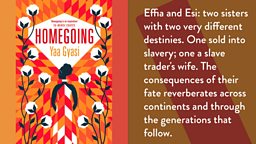
���˿���going tells the story of two sisters: one who is sold into slavery, the other married to a slave-owner.
The novel charts the journeys of their ancestors down through the generations and across continents, from the Gold Coast of Africa, to the plantations of Mississippi, and to the projects of Harlem. Told through 14 narrators, we see how events in the past continue to reverberate through to the modern day.
Join the conversation - Book Club Questions
1. How does the novel question the theme of home and belonging? Is home simply where we live or something more?
2. Many characters in the novel are born into slavery. In what other ways does the novel show the narrators to be enslaved or bound?
3. The story follows a family tree shown at the start of the novel. What does the novel tell us about parenthood and family? How does parenthood affect the characters in the novel?
Get Involved
-
![]()
LISTEN: Yaa Gyasi talks to Mariella Frostrup
Yaa Gyasi discusses her tale of two sisters with strikingly different destinies, and the way their lives reverberate through the generations.
-
![]()
#Vote100Books: 7 novels by women that deserve your attention
At Hay Festival 2018, ���˿��� Arts highlighted seven titles that deserve to be on everyone's reading list from the #Vote100 list selected by the public.
���˿���going weaves a spectacular epic . . . Gyasi gives voice not just to a single person or moment, but to a resonant chorus of eight generations.Los Angeles Review of Books

Small Island by Andrea Levy, 2004

Andrea Levy’s mother and father sailed to England in 1948 on the Windrush, and through its four main characters Small Island tells of post-war Caribbean migration at that time.
Gilbert and Hortense leave behind the warmth and sunshine of Jamaica to follow their dreams of a better life in the Mother Country. They find lodgings in the house of Queenie and Bernard, at a time when London is recovering from the war. Post-war London is a cold, shabby and hostile place in which Gilbert and Hortense encounter widespread prejudice and racism.
Join the conversation - Book Club Questions
1. What is the significance of the title of the novel, Small Island?
2. Queenie, Hortense, Gilbert and Bernard narrate the story in turn. Who is your favourite character and why?
3. What differences did you see in the way the British and US armies treated their black recruits?
Get Involved
-
![]()
WATCH: Andrea Levy returns to her school
Levy tells Alan Yentob about how literature can transform lives for the better.
-
![]()
LISTEN: Small Island at the National
The National Theatre's Artistic Director Rufus Norris, and the cast and crew of Small Island, talk about the challenges of recreating the Caribbean migrant experience.
The idea that me, someone from my background, could come along and write a book... that's a revelation. And literature is the most fantastic piece of communication - especially in the novel.Andrea Levy

The Bell Jar by Sylvia Plath, 1963
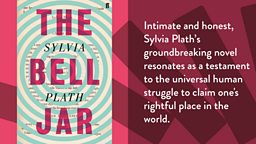
A classic of American literature, The Bell Jar tells the story of Esther Greenwood, a nineteen-year-old spending a month working in New York after winning a competition to be a junior editor at a magazine.
As she struggles to fit in with the other girls, and tells of problems she has with her family and a previous boyfriend, her mental health declines with serious consequences.
Join the conversation - Book Club Questions
1. What expectations does society have of men and women in the novel? How have those views changed?
2. What is the meaning of ‘the bell jar’ in the title?
3. How has the conversation about mental health changed since the 1960s when The Bell Jar was first published?
Get Involved
-
![]()
LISTEN: Ali Smith on The Bell Jar
In 2013, Ali Smith talked to Mariella Frostrup to celebrate the 50th anniversary of Sylvia Plath's ground-breaking novel The Bell Jar.
-
![]()
GALLERY: Sylvia Plath in pictures
Radio 4's Book of the Week showcases photographs showing events in the life of Sylvia Plath.
I feel that in a novel you can get in toothbrushes, and all the paraphernalia of daily life... and I find this more difficult in poetry, which I feel is a tyrannical discipline.Sylvia Plath, 1962

The God of Small Things by Arundhati Roy, 1997
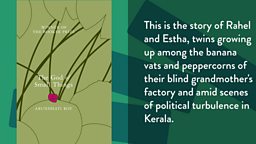
Addressing issues of politics, family relationships and forbidden love, The God of Small Things tells the story of twins, Estha and Rahel, who are forced apart following devastating events.
Through a series of flashbacks and flash-forwards, the multi-generational familial drama is revealed.
Join the conversation - Book Club Questions
1. What effect do you think the narrative structure has? Would you have read it differently if the events had been presented in chronological order?
2. How is social class, in particular the caste system, shown to be important to the characters?
3. What is the relevance of the ‘small things’ referred to throughout the novel?
Get Involved
-
![]()
WATCH: Arundhati Roy: There's no such thing as a perfect story
The God of Small Things author reads a passage from her essay The End of Imagination, at Hay Festival 2019.
-
![]()
LISTEN: The God of Small Things on Bookclub
Arundhati Roy talks to James Naughtie and readers about her Booker Prize-winning novel The God of Small Things.
Only a novel can tell you how caste, communalisation, sexism, love, music, poetry, the rise of the right all combine in a society... We have been trained to “silo-ise”: our brains specialise in one thing. But the radical understanding is if you can understand it all, and I think only a novel can.Arundhati Roy, The Guardian, 2018

Things Fall Apart by Chinua Achebe, 1958
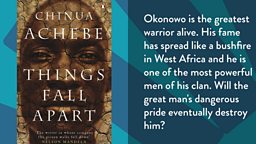
Okonkwo is a well-respected warrior, an integral part of his African community who is held in high-esteem, and seen to uphold all the ways of life of his clan, grounded in tradition.
Yet the narrative is set during a time of change and transition - predominantly the arrival of Western missionaries - and a shifting of beliefs and societal structures. We follow Okonkwo as he battles these changes, and see how this ultimately leads to his downfall.
Join the conversation - Book Club Questions
1. We often see the inner turmoil of Okonkwo, which he hides from his family, such as the difference between what he feels and how he acts to preserve his sense of identity. Do you think that tension is well articulated?
2. How do you feel about the work of the Western missionaries? Are we led to see them as an imposition, or a necessary force for good?
3. Things Fall Apart is seen as blazing a trail for future African voices, and Africans 'owning' their narrative, compared to colonialist literature. What significance does this hold?
Get Involved
-
![]()
LISTEN: Chinua Achebe's Lament - Explore the legacy of Things Fall Apart
Zina Saro-Wiwa explores the legacy of Africa's first great post-colonial novel, Things Fall Apart by Chinua Achebe.
-
![]()
LISTEN: Achebe's daughter on the book that kick-started an African culture revolution
Achebe's youngest daughter, Nwando Achebe, on the 1958 book that revolutionised African culture and began a whole new genre of world literature.
It is the storyteller who makes us what we are, who creates history. The storyteller creates the memory that the survivors must have - otherwise their surviving would have no meaning.Chinua Achebe

White Teeth by Zadie Smith, 2000

A sweeping saga about the actions and interactions of three generations of the Jones, Iqbal and Chalfen families.
Beginning with Archie Jones and Samad Iqbal’s friendship forged during the Second World War, and progressing to their children’s lives in London at the close of the 20th century, White Teeth explores the ways our history defines ourselves today.
Join the conversation - Book Club Questions
1. How do the Joneses, Iqbals and Chalfens discuss race and religion / belief systems across generations? How far do attitudes towards multiculturalism change these discussions and experiences?
2. How do the characters allow the idea of ‘fate’ to control their lives? Is fate important?
3. Are our identities shaped by our actions and experiences or by genetics and family history?
Get Involved
-
![]()
LISTEN: Zadie Smith on the impact of White Teeth
James Naughtie talks to Zadie Smith on Bookclub about the impact of White Teeth, her debut novel.
-
![]()
LISTEN: Zadie Smith on the concept of 'Englishness'
Zadie Smith ponders her understanding of the concept of being 'English' and her own place within English-speaking literature.
The idea of multi-culturalism as an idea or an ideology is something I never understood. We don't walk around our neighbourhood thinking how is this experiment going - this is not how people live. It's just a fact.Zadie Smith, Today, 2010

Book Club Questions on Identity
That wraps up our 10 novels in the Identity theme. Here are five questions to provoke some thoughts around your reading in this theme. And below, to continue exploring Identity, try our further reading suggestions as a starting point.
1. To what extent are characters in novels created by their surroundings, both geographically and as a result of the time period in which they live?
2. Many novels that focus on identity cover a long period of someone’s life, often drawing upon childhood experiences. Why do you think authors write their characters or plot in this way?
3. Do you think that it’s important to read novels set in countries or cultures different to your own?
4. Do you think it helps to know about an author’s own identity when reading their novel? Do you feel they can truly be separated?
5. Are there any novels that you have read with characters whose identities you can particularly relate to?
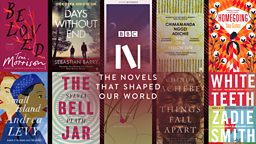
Get Involved
More novels exploring Identity
A Portrait of the Artist as a Young Man by James Joyce
Flowers for Algernon by Daniel Keyes
Girl, Woman, Other by Bernardine Evaristo
Orlando by Virginia Woolf
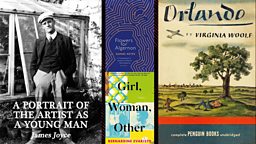
- Produced with support from
- Most of the books on the Novels 100 list are available in various formats from the .

- Novels That Shaped Our World is run in partnership with and is supported by .
Get involved with Novels
-
![]()
Review novels and get personalised book recommendations
-
![]()
Share the book you love on Twitter
-
![]()
Tell us about the novels you love on Facebook
-
![]()
Show us a books you love on Instagram
Novels and Identity on ���˿��� Sounds
-
![]()
The place of Identity in novels
Mariella Frostrup discusses Identity novels with Ellah Wakatama OBE, novelist Charlotte Mendelson and Derek Owusu, a writer, poet and podcaster, on Open Book.
-
![]()
The Bell Jar - A Close Reading
Jami Attenberg explores Sylvia Plath's 'surprisingly witty' novel that shaped her world for Open Book.
-
![]()
The Bell Jar by Sylvia Plath
Sylvia Plath's haunting and iconic only novel, read by Lydia Wilson over eight episodes: weekdays from Jan 13th on ���˿��� Radio 4 Extra.
Brilliant books content on ���˿��� iPlayer
-
![]()
Novels That Shaped Our World
Looking at class in all its shapes and sizes, from all sides of the class divide, in the UK, USA and India
-
![]()
Everything Is Connected - George Eliot's Life
Gillian Wearing's experimental film, made up of a diverse cast of people, celebrate the legacy of the Victorian author
-
![]()
Face to Face: Maya Angelou
In this classic interview from 1994, Jeremy Isaacs talks to Maya Angelou about her life, her writing and her hopes for the future



